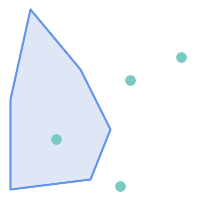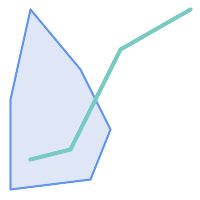Name
ST_Crosses — Tests if two geometries have some, but not all, interior points in common.
Synopsis
boolean ST_Crosses(geometry g1, geometry g2);
Description
Compares two geometry objects and
returns true if their intersection "spatially cross", that is, the
geometries have some, but not all interior points in common. The
intersection of the interiors of the geometries must be non-empty
and must have dimension less than the maximum dimension
of the two input geometries. Additionally, the intersection of the two
geometries must not equal either of the source geometries. Otherwise, it
returns false.
In mathematical terms, this is:

Geometries cross if their DE-9IM Intersection Matrix matches:
T*T******for Point/Line, Point/Area, and Line/Area situationsT*****T**for Line/Point, Area/Point, and Area/Line situations0********for Line/Line situations
For Point/Point and Area/Area situations this predicate returns
false.
The OpenGIS Simple Features Specification defines this predicate only for Point/Line, Point/Area, Line/Line, and Line/Area situations. JTS / GEOS extends the definition to apply to Line/Point, Area/Point and Area/Line situations as well. This makes the relation symmetric.
![[Note]](images/note.png) | |
This function automatically includes a bounding box comparison that makes use of any spatial indexes that are available on the geometries. |
![[Important]](images/important.png) | |
Enhanced: 3.0.0 enabled support for |
 This method implements the OGC Simple Features
Implementation Specification for SQL 1.1. s2.1.13.3
This method implements the OGC Simple Features
Implementation Specification for SQL 1.1. s2.1.13.3
 This method implements the SQL/MM specification. SQL-MM 3: 5.1.29
This method implements the SQL/MM specification. SQL-MM 3: 5.1.29
Examples
The following situations all return true.

| 
|

| 
|
Consider a situation where a user has two tables: a table of roads and a table of highways.
CREATE TABLE roads ( id serial NOT NULL, geom geometry, CONSTRAINT roads_pkey PRIMARY KEY (road_id) );
|
CREATE TABLE highways ( id serial NOT NULL, the_gem geometry, CONSTRAINT roads_pkey PRIMARY KEY (road_id) );
|
To determine a list of roads that cross a highway, use a query similiar to:
SELECT roads.id FROM roads, highways WHERE ST_Crosses(roads.geom, highways.geom);